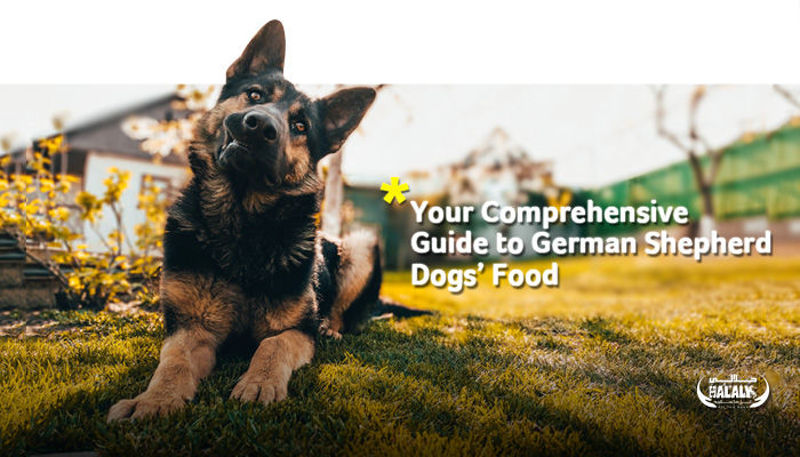German Shepherd dogs are known for their loyalty, intelligence, and majestic appearance. As the owner of one of these wonderful dogs, you want to make sure that they receive the best care, especially when it comes to their diet. In this comprehensive guide, we will delve into the world of German Shepherd dog eating habits, and provide you with valuable tips and advice tol help you make the right decisions about their nutrition.
The most important basics in German Shepherd dog food
The German Shepherd, like all dog breeds, has specific nutritional needs. To ensure your German Shepherd's health thrives, you must understand its nutritional needs. Here are the most important points that you should pay attention to when choosing German Shepherd dog food.
A protein-rich diet
German Shepherds are very active dogs with a strong muscular frame. Which means they need a diet rich in high-quality protein. On your German Shepherd's foraging journey, always look for dog food that contains real meat, such as chicken, beef, or lamb, as the primary ingredient.
Balanced essential nutrients
In addition to protein, German Shepherds need a balanced diet that includes fats and carbohydrates. Make sure to choose a dog food that provides the right mix of these essential nutrients to maintain their energy level and overall health.
Nutrient-rich ingredients
When you choose a food for your German Shepherd, carefully read the ingredient list to check the availability of essential vitamins and minerals such as calcium, phosphorus, and fatty acids. These nutrients are vital for developing strong bones, a healthy coat, and a strong immune system.
Points to consider when choosing German Shepherd dog food
After ensuring that their nutritional needs are met, here are some points you should take into consideration when choosing food for your German Shepherd:
-
Age of the Your German Shepherd Dog
Nutritional requirements for German Shepherd dogs vary depending on age. Puppies, adult dogs, and older dogs have different nutritional needs. Consult your veterinarian to determine the best diet plan for your dog's life stage.
-
Meals frequency
A healthy adult German Shepherd usually needs two meals a day, but puppies may need more meals, usually three to four meals a day. Establish a consistent feeding schedule to aid digestion and avoid overfeeding. Ask your vet about the number of meals needed for your German Shepherd.
-
The amount of food in a German Shepherd's meal
Avoid excessive amounts of food for the German Shepherd dog, to avoid obesity. Follow the quantities recommended in the instructions on the dog food package, or ask your veterinarian about the amount of food required for your German Shepherd to determine the appropriate amount based on the dog’s age, size, activity level, and other factors.
Precautions to be taken regarding German Shepherd dogs' food
When considering food for your German Shepherd, keep these precautions in mind, so that your dog gets the maximum benefit and optimal nutrition from the food.
Allergies
Some German Shepherds may suffer from allergies to some types of food or additives. Watch the dog carefully and watch for any signs such as itching, digestive problems, ear infections, or any strange and unusual signs. If you suspect your dog has an allergy, consult a veterinarian to determine the cause, receive appropriate treatment, and determine the appropriate diet accordingly.
Gastrointestinal disorders
The German Shepherd is one of the breeds most susceptible to gastric dilatation-volvulus (GDV), a life-threatening condition that mainly affects large and giant breeds of dogs. To reduce the risk, feed your dog smaller meals, divide it into more meals, or use a slow feeder to help your dog eat at a slower rate.
Homemade food or packaged dog food?
Choosing between offering homemade food and purchasing ready-to-serve packaged food for your dog is a decision every German Shepherd dog owner faces.
On the one hand, eating homemade food ensures that the food is always of good quality. On the other hand, pre-packaged dog food provides measured and known amounts of nutrients, allowing you to determine what your German Shepherd eats or avoids eating.
The choice of German dog food depends on the dog’s health, physical condition, age, and health needs. Consult your veterinarian about the ingredients that should be present in your German dog food.
Providing your German Shepherd with a nutritious diet is essential to its quality of life and overall health. By understanding your German Shepherd's nutritional requirements and following feeding guidelines, you can rest assured that your pet is living a healthy and happy life. Remember, consulting your veterinarian is always a wise choice to tailor a diet plan that suits your dog's desired needs. With the right diet, your German Shepherd's health will thrive.























































